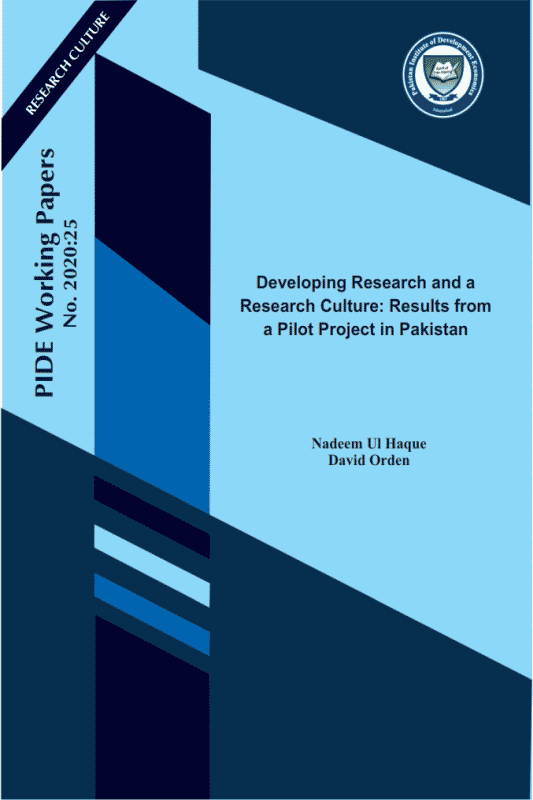Developing Research and a Research Culture: Results from a Pilot Project in Pakistan (PIDE Working Papers 2020: 25)
ABSTRACT
This paper argues that successful public policy requires engaged research developing ideas and evidence from diverse vantage points. Pakistan’s social science research remains fragmented, under-resourced and dependent on external agendas. We describe a five-year pilot programme to enhance Pakistan’s research culture. Seventy-two crowd-sourced and competitively-selected projects at 46 geographically dispersed institutions were supported. Provincial universities were empowered and networking with the better-placed metropolitan institutions proved mutually beneficial to scholarship. Substantial research outputs were completed in important areas of policy. We conclude that such multi-year commitments to review and network engagement are vital to strengthening policy capacity.
1. INTRODUCTION
Human resource capacity building has been a central issue in development for decades. Numerous donor agencies have devoted large sums of money to institutions of higher education, scholarships, technical assistance training, and creation of NGOs and on-ground projects. Years later problems persist and the primary response donor-funded policy circles have has been more of the same. Yet in countries like Pakistan, well-trained university professors are short in supply, policy oriented research is undertaken mainly by donors, and government supplies little research-based information on important socio- economic problems.
This paper examines the research culture and environment in Pakistan to assess some of its limitations and why there is little indigenous economic and other social science research being undertaken to affect public policy. We depict the interface of ideas, research and policymaking that characterise well-developed networked systems. We then report on a five-year pilot competitive grants programme conducted with some success to stimulate social science research and debate across Pakistan, and draw some implications from this experiment. The objective of this pilot programme was to build a network to stimulate internally defined and produced policy-relevant research within a context of crowd-sourced ideas, competitive project selection, extended discussion among researchers, and intensive peer review.
Among the concerns that arise in Pakistan and similar contexts is that despite substantial donor investment in higher education essential government positions do not draw applications of requisite quality. Positions such as Chief Economist at the Planning Commission have sometimes remained unfilled for many years despite repeated announcements. Key public agencies such as regulatory bodies and public sector enterprises continue to remain in search of skilled staff. Pakistan now has 180 universities compared to just one when it gained independence. Yet in few cases is there a sufficient cadre of experienced full professors to provide needed leadership. Policy for building up universities has concentrated on dispensing land grants and construction of new facilities, but once built they rely mainly on a young inexperienced faculty and part-time teachers with a variety of qualifications.
Dependence on donors for project development and policy change has raised several additional concerns. To an extent this system has suited post-independence governments that mostly desired to bypass domestic policy assessments. The policy mindset in Pakistan and other recipient countries has been preoccupied with looking for aid rather than nurturing domestic processes to unlock productivity and growth. The result is that fiscal and balance of payments difficulties have persisted over the years, reinforcing the mindset of looking for more external assistance. Both dictators and democratic leaders have as a result become increasingly reliant on the policies and conditionality that comes with aid. Evaluation of policy implementation is often done by donors in support of their own programmes—an obvious moral hazard.




